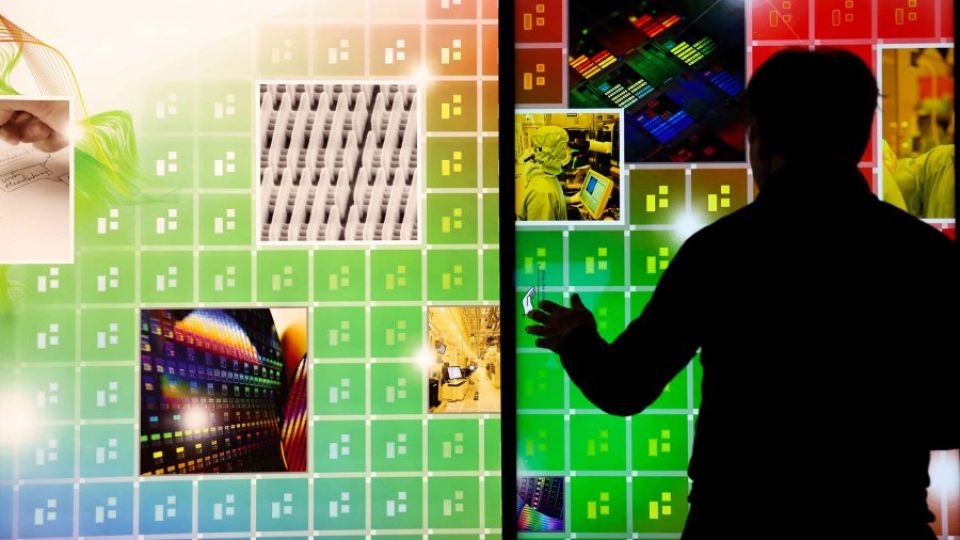February 20, 2025
TAIPEI – Taiwan may be a world leader when it comes to contract chipmaking, but make no mistake, the island is not challenging the US for tech dominance.
Instead, Taipei is trying to persuade Washington that it seeks cooperation – not competition – even as US President Donald Trump has repeatedly accused Taiwan of stealing the chip business from his country.
Late on Feb 18, Mr Trump said he planned to impose tariffs of at least 25 per cent on all semiconductor imports, with the possibility of going “very substantially higher over the course of a year”. He did not specify a date but said he wanted to allow time for chipmakers to set up American factories so that they can avoid tariffs.
He had previously threatened tariffs of up to 100 per cent on Taiwan-made chips.
“Taiwan took our chip business away… We want that business back, we want it back in the United States,” the American leader told reporters on Feb 13 as he vowed to reshore manufacturing via tariff policies.
But analysts said the message behind Taipei’s response, delivered via a speech by Taiwanese President Lai Ching-te a day later on Feb 14, is clear: Taiwan is not taking from the US but enabling the US to stay ahead.
“Lai knows Taiwan can’t afford to get into a back-and-forth with Trump over who benefits more from the chip industry. Instead, he’s focusing on keeping Taiwan indispensable,” said Professor Julien Chaisse, an international trade expert at City University of Hong Kong.
“If Washington sees Taiwan as an economic necessity rather than a rival, US policymakers will think twice before adopting measures that could disrupt semiconductor supply chains,” he told The Straits Times.
Mr Lai pledged in his speech to communicate more closely with the US government for “mutual benefit”.
“This will help the new (US) administration’s team to better understand how Taiwan is an indispensable partner in the process of rebuilding American manufacturing and consolidating its leadership in high-tech, and that Taiwan-US cooperation will benefit us both,” he said in remarks after a meeting of the National Security Council.
Prof Chaisse said: “Instead of challenging Washington’s push for self-sufficiency, Taiwan is making the case that cooperation is the smarter path.”
The island is home to the world’s largest contract manufacturer of chips, Taiwan Semiconductor Manufacturing Company (TSMC), which produces the majority of the globe’s most cutting-edge chips that power crucial artificial intelligence applications. Some of the firm’s top customers are American tech giants such as Apple and Nvidia.
For Taiwan, there is more at stake in maintaining a positive relationship with the US than economic reasons.
Taipei sees Washington as its most important security backer against Beijing, which claims the self-ruled economy as its territory and has in recent years ratcheted up military, diplomatic and economic pressure on the island.
But Taiwan is now having to scramble to reach compromises with the US on trade as the spectre of Mr Trump’s tariffs on overseas-made chips looms.
On Feb 15, Taiwan’s top technology official said Taipei was willing to help “friendly democratic countries” play their appropriate roles in the semiconductor supply chain.
In a Facebook post, Mr Wu Cheng-wen, head of Taiwan’s National Science and Technology Council, said each country has its own speciality when it comes to chips, including the US, which is “second to none” in the design of innovative systems.
“Given that each country has its own unique industrial strengths, there is no need for a single nation to fully control or monopolise all technologies globally,” he wrote.
While Mr Trump is hoping that hefty tariffs would incentivise more Taiwanese chip manufacturers to relocate production to the US, experts pointed out that the measure may not be enough.
Mr Stephen Ezell, vice-president for global innovation policy at Information Technology and Innovation Foundation, a Washington-based think-tank, said: “Manufacturing semiconductors is perhaps the most complex, expensive engineering task humanity undertakes… and tariffs alone aren’t enough to justify relocating a US$20 billion (S$27 billion) fab or choosing the US versus another location for a new facility.”
He told ST: “So the notion that Trump’s tariffs would induce this stampede of manufacturing from Taiwan or elsewhere to the United States, especially in the semiconductor sector, is completely fanciful.”
Experts noted that chip tariffs on Taiwan are unnecessary, as Taiwanese firms are already making significant investments in the US in the sector.
So far, TSMC has pledged US$65 billion towards three state-of-the-art fabs in the US state of Arizona, bringing along with it 14 Taiwanese suppliers of semiconductor inputs.
Mr Lai had noted how Taiwan’s investments in the US had exceeded US$100 billion by the end of 2024, fostering the creation of 400,000 jobs.
“Taiwan has always been one of the US’ most reliable trade partners, as well as one of the most important cooperative partners of US companies in the global semiconductor industry,” he said.
Mr Ezell said: “The greatest irony of these proposed tariffs is that Trump simply doesn’t need them… Taiwanese companies are already investing in the US.”
- Yip Wai Yee is The Straits Times’ Taiwan correspondent covering political, socio-cultural and economic issues from Taipei.


